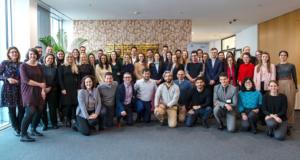
Read more

SSM-EUI partnership on SSM Banking Supervision Learning Services
Duration: 2022 – 2026
Established in 2022, this partnership develops a comprehensive training programme for all European banking supervisors across the Single Supervisory Mechanism (SSM). The programme, which will run for at least four years, will train about 6,000 supervisors at the European Central Bank (ECB) and at the National Competent Authorities. This collaboration supports the Single Supervisory Mechanism in delivering on its priority objectives, increasing the consistency of supervisory approaches, and, thus, becoming a key component to further integrating European banking supervision.
The programme focuses on new skills necessary for financial supervisors to understand and address emerging cyber, digital, climate, and environmental risks. It also covers more effective management of traditional risks, such as those related to credit and liquidity.
The main building blocks of the programme include:
Furthermore, as part of this partnership, a Banking Supervision Policy working paper series was launched in 2024, with the aim of promoting policy and research on Banking Supervision.

Read more

Read more

Read more